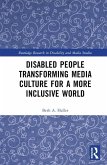Jérôme Bel's Disabled Theater, a dance piece featuring eleven actors with cognitive disabilities from Zurich's Theater HORA, has polarized audiences worldwide. Some have celebrated the performance as an outstanding exploration of presence and representation; others have criticized it as a contemporary freak show. This impassioned reception provokes important questions about the role of people with cognitive disabilities within theater and dance-and within society writ large. Using Disabled Theater as the basis for a broad, interdisciplinary discussion of performance and disability, this volume explores the intersections of politics and aesthetics, inclusion and exclusion, and identity and empowerment. Can the stage serve as a place of emancipation for people with disabilities? To what extent are performers with disabilities able to challenge and subvert the rules of society? What would a performance look like without an ideology of ability?
"[Disabled Theater] provides a key to understanding the work of an artist whose influence has been crucial to the development of the so-called performance art renaissance within the contemporary scene. It also explores the possibilities for social emancipation from aesthetic judgment on stage."-Flash Art








